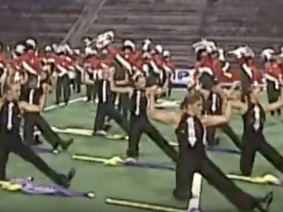Repertoire
- Short Ride in a Fast Machine
- John Adams
- Jug Blues and Fat Pickin'
- Don Freund
- Variants on a Medieval Tune
- Norman Dello Joio
- New Era Dance
- Aaron Jay Kernis

2001 was the end of both an era and a mentality that came along with it…
There was a large age-out class this year, many of whom started with the corps in 1997 and 1998. These veterans carried with them a harsh and intimidating leadership approach that involved digging into other members when they made a mistake. After all, this is what these veterans had experienced themselves when they were new. However, the corps culture began to shift toward that of a more supportive environment.

“In 2001, there were more multi-year vets in each section: lots of institutional memory, lots of pressure on the new members to live up to that. I think it was frustrating at times.”
“I used to do that. I used to be a yeller. I used to be a screamer at kids, and I would be mad, like ‘why are you offending me by messing up and being a tick?`[But] it has nothing to do with me that someone messes up! In 2001, I was like, ‘Look, I want to make sure these people have a great experience.’ I wanted to make sure that people went away from that year and had a great feeling about us, the age-outs who nurtured them instead of beating on them.”
“I’m glad to see that has changed… It’s not, ‘You’d better do this or you’re terrible.’ It’s ‘Let’s bring you in, let’s teach you these things.’ Even the terminology has changed: 1st year member versus rookie and veteran. When you first do something, of course you don’t know how to do it. Everyone has been new at a job at one point, and you’ve got to figure it out, but do you want to figure it out being yelled at every day, or do you want to figure it out by someone teaching you in a kind and productive manner?”
“I was kind [on] the cusp, because I was taught one way, and I taught a different way at the Vanguard. Being on staff, there are still those days where you get angry and yell and tell them to run, but it’s different because there is support there in the staff.”
Fitting with the theme of evolution, the program, New Era Metropolis, told the story of a workday of a 9-5 job. The show began with a dream-like tune from the front ensemble and rapid silent drill from the hornline, drumline, and color guard; then an alarm clock was heard blaring as the hornline and drumline entered with a loud chord progression. Clocks and watches featured throughout the visuals – a reminder of the need to be “on the clock.” Later, various pieces in the show represented the commute to work, the day-to-day monotony while on the job, a daydream, and a celebration of ending the workday.
The closer, “New Era Dance,” packaged innovation together with a nod to history. The whole corps rhythmically chanted the words “new era”, while the color guard performed a hip hop dance number, followed by a single step of the bottle dance. Guard member Emily Mavroudis Contreras did a high mark time with a traditional salute before the color guard picked up their flags for an ensemble flag statement.

The visual staff, all of whom were SCV alumni, and in particular Myron Rosander, instilled the members with a sense of purpose beyond merely performing a show. They had a deep belief in the potential of every member and held the corps to that expectation, both as performers and as individuals off the field.
“Dylan (Thompson) was the reason I joined the corps. He did a thing with his students, and it didn’t matter if he was talking to a high school, a division 3 corps, or the Vanguard – he went to each member and got in their face and said, ‘You are capable of great things.’”
“Dylan told me one day, ‘You don’t walk like you march.’ I was like, ‘What is that supposed to mean?’ But as I grew up and entered real life, what I took from that is that when you’re marching, you have a certain sense of confidence and strength and knowledge that what you’re doing is important and special and you’re doing it really well. And in life, you don’t always have that same sense of confidence and importance. Every so often, I’ll be walking with my head down, and I’ll think of that. It just changes my perspective. I should be confident.”
“I have clear memories of Myron saying, ‘Why would you just walk past that piece of trash on the ground and live with the fact that it will continue to be on the ground after you walk away?’ It’s your responsibility to pick it up and make the world a better place in everything that you do, regardless of whether anyone is watching. That has stuck with me forever, and I think about it often.”